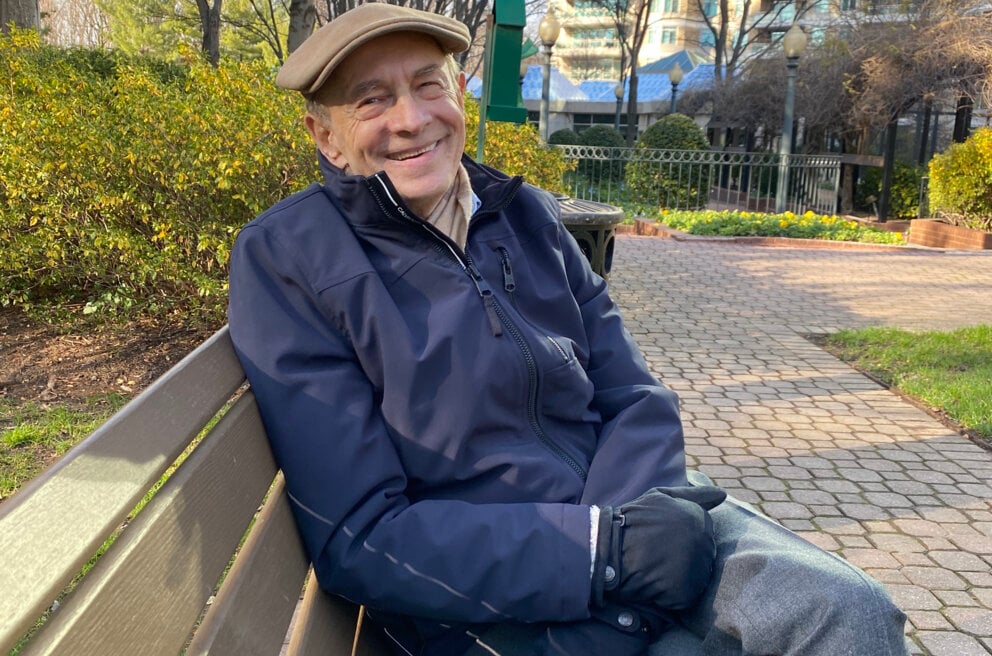Harvey J. Alter
Interview
Interview, December 2020

Harvey Alter in December 2020 during an interview with nobelprize.org
@ Nobel Prize Outreach. Photo: Anna Sjöström Douagi
“I became the poet laureate of hepatitis”
Nobelprize.org interviewed Harvey J. Alter on 11 December 2020. We spoke with him about receiving the Nobel Prize, his journey in science and the roles humour and poetry have played in his work.
Telephone interview, October 2020
“The third time, I got up angrily to answer the phone … and it was Stockholm”
Telephone interview with Harvey J. Alter following the announcement of the 2020 Nobel Prize in Physiology or Medicine on 5 October 2020. The interviewer is Adam Smith, Chief Scientific Officer of Nobel Media.
Harvey Alter’s anger at being disturbed by a call in the night was quickly transformed when he learned he had been awarded a share of the 2020 Nobel Prize in Physiology or Medicine for the discovery of the Hepatitis C virus. “The best alarm clock I ever had!” In this call, recorded shortly after he heard the news, he describes the message of the 50 year quest that led to this Nobel Prize as being that undirected, basic research is sometimes the only way to find things out. As he puts it, “You don’t always know where you’re going.”
Interview transcript
Harvey J. Alter: Hello?
Adam Smith: Hello, am I speaking with Professor Alter?
HA: Yes, yes you are. Just woken up.
AS: My name is Adam Smith. I’m calling from Nobelprize.org, the website of the Nobel Prize in Stockholm.
HA: Yes, I’m not shocked because I got a morning phone call, which put me into shock. You’re the aftershock.
AS: I’m proud to be the aftershock, that’s a nice idea. So, were you asleep when the call came?
HA: Yes, I was, yeah, it was 4:45 I think on the east coast here. The phone rang… and who the heck is calling? And I didn’t answer it. And then about 5 minutes later it rang again and still, still didn’t answer it, and the third time I got up angrily to answer it. It was Stockholm. It was a weird, weird experience.
AS: I imagine your anger subsided fairly fast.
HA: [Laughs]. It did, yes, it went away in about a second. It was replaced by the shock.
AS: What was the first thing you did after hearing the news?
HA: I told my wife. I woke her up. It’s just… you know, it’s so kind of other-worldly. It’s something that you don’t think will ever happen, and sometimes don’t think you deserve it to happen. And then it happens in this crazy COVID year, just where everything is turned upside down. This is another, nice upside down for me.
AS: It’s a very hopeful story of science, the discovery and then virtual eradication, at least in many countries, of Hepatitis C. I mean, it was decades of work wasn’t it?
HA: Yeah, you know, it’s a good story for kind of non-directed research, where we have a hypothesis, but you have no idea where it’s going to go, just looking to see what caused post-transfusion Hepatitis, and initiated, you know, a very, very, very long study, that involved many people. And that was all done at NIH, and probably could not have been done anywhere else because it took so long to come up with something you didn’t really expect to find. But it was decades, and a lot of people, Bob Purcell and particularly Paul Holland and Paul Schmidt who were in the blood bank with me. But Bob Purcell was a very basic scientist. It’s really a 50-year story.
AS: It’s a real detective story as well. I mean, it’s thrilling stuff. And these stories in a way need to be told to the next generation so that they too become virus hunters.
HA: Yeah, yeah, the message that I think is important is that you don’t always know where you’re going. Nowadays research is so directed, and so has to come up with a drug fast, but at NIH they allowed me to just… go my way. And, so, paid off, way beyond… You know, to have a cure, to see the first case, what was officially called ‘non-A, non-B’, the first case, and then see these curative drugs, and see so many people getting cured, and nobody getting post-transfusion Hepatitis, that’s like astounding.
AS: It must be amazing, to see the direct effect of your work and the work of many others, yes.
HA: Yeah, you know, nothing I thought would happen really.
AS: How wonderful.
HA: Thank you. Thank you for calling.
AS: Thank you. Many congratulations.
HA: It’s the best alarm clock I’ve ever had!
AS: Well you should record it, you should have recorded the call and then you could use it every day thereafter.
HA: [Laughs]. Okay!
AS: Thank you.
HA: Thank you.
AS: Look forward to speaking again. Thank you.
HA: Bye bye, thank you.
Did you find any typos in this text? We would appreciate your assistance in identifying any errors and to let us know. Thank you for taking the time to report the errors by sending us an e-mail.
Nobel Prizes and laureates
Six prizes were awarded for achievements that have conferred the greatest benefit to humankind. The 12 laureates' work and discoveries range from proteins' structures and machine learning to fighting for a world free of nuclear weapons.
See them all presented here.
